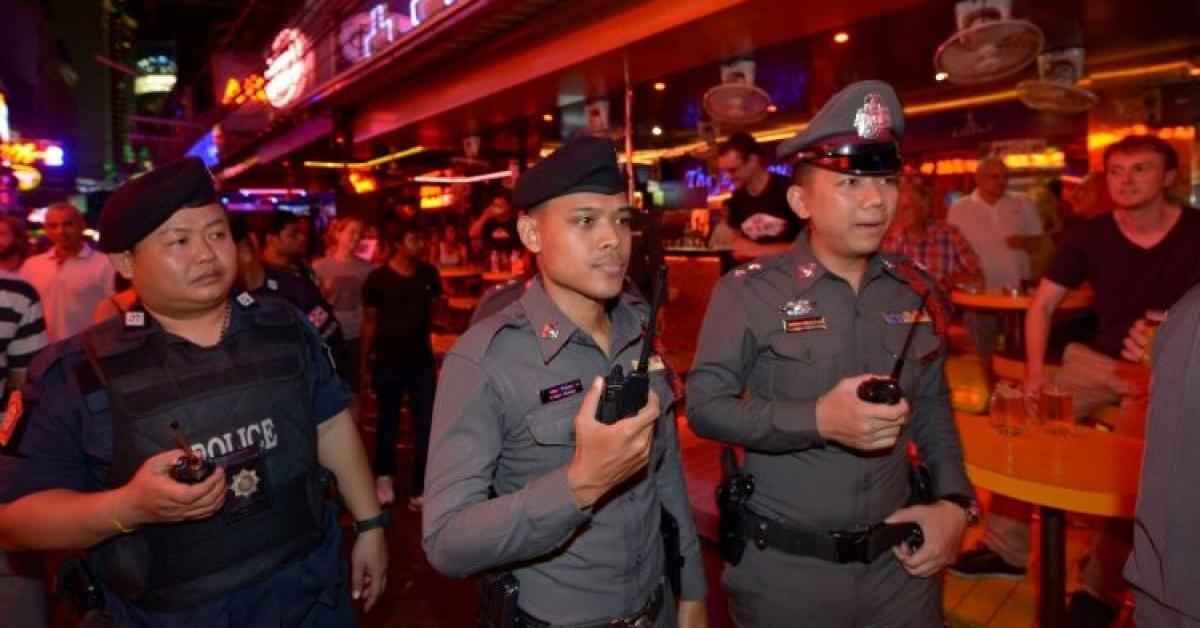Live
- Avvatar India and Spartan Race Kick Off India’s Ultimate Fitness Challenge in Bengaluru
- CM Revanth Reddy Pays Tribute to Guru Nanak on His Birth Anniversary
- ‘Matka’ clears censor: run-time locked
- ‘Kubera’ first glimpse looks interesting
- It took me 20 years to reach Sahnkar sir’s ears: Thaman S
- Gaurav Bhatia slams Congress for promising freebies to infiltrators in Jharkhand
- LIC’s entry into health insurance to significantly boost its market share
- Why Covid-19 Vaccine protection wanes over time?
- First Look of Kaliyugam 2064 Unveiled by Mani Ratnam Ahead of Worldwide Release
- Sutraa Indian Fashion Lifestyle Exhibition kicked off at Taj Krishna
Just In

x
Highlights
Thailand said Thursday it would seek Interpol help in hunting a foreign man believed to have carried out a devastating Bangkok shrine bombing, with police unsure if he had fled the country.
Thailand said Thursday it would seek Interpol help in hunting a foreign man believed to have carried out a devastating Bangkok shrine bombing, with police unsure if he had fled the country.
.jpg)
An arrest warrant was issued for the unnamed bespectacled suspect, who was filmed on security footage placing a backpack at the shrine before Monday's blast that tore through the popular tourist site.
The attack on the Erawan shrine killed 20 people, mostly Asian visitors, leaving residents of the Thai capital fearful of another attack and hammering the nation's vital tourism sector.
Nobody has claimed responsibility for the bombing, which has no precedent in Bangkok.
Police have said the foreigner and potentially at least two other men were part of a network, but have so far revealed few other strong leads and authorities moved Thursday for outside assistance.
"We will seek help from Interpol today (Thursday)," Major General Apichart Suriboonya, the head of Thailand's Interpol unit, told AFP.
"We have to use them... if any country has information on the suspect they can send it to us."
A so-called Interpol 'Blue Notice' asks its global membership to collect additional information on a suspect.
Police released a sketch of him on Wednesday showing him in glasses and with dark hair, describing him as tall and with fair skin but with generally ambiguous features that made it hard to determine his ethnicity.
But police said Thursday they were unsure of his whereabouts.
"We are doing our best," police spokesman Prawut Thavornsiri told AFP.
"We have received a lot of information from the public since releasing of the sketch... we are investigating those leads."
But when asked if the prime suspect was still in the kingdom, Prawut said: "I don't know".
The arrest warrant, issued by a Bangkok court on Wednesday, accused the unnamed foreigner "of premeditated murder, attempted murder and bomb-making".
Police have said they are looking two other men also seen on security footage at the Erawan shrine before the blast who may have been his accomplices.
The men -- one in a red shirt, the other in white -- can be seen standing in front of the chief suspect as he calmly places the backpack under a bench inside the shrine gates.
They security footage shows them standing in front of the primary suspect, who is wearing a bright yellow T-shirt and glasses, as he leaves the bag.
Prawut on Wednesday gave a more detailed profile of the suspected ethnicity of the alleged bomber, using the Thai phrase "khaek khao" -- a word used to describe light-skinned Muslims from South Asia, Central Asia and the Middle East.
Those comments came during a night patrol of Soi Cowboy -- one of Bangkok's most famous red-light districts which is packed with foreigners -- which was designed to reassure visitors.
- Motive mystery -
The bomb struck during Monday's rush hour in a popular tourist area in the city's commercial heart, studded by upscale shopping malls and hotels.
It claimed the lives of at least 13 foreigners -- from Britain, China, Hong Kong, Indonesia, Malaysia and Singapore.
Another 67 people remained in hospital by late Wednesday, 12 of whom were in critical condition.
Prime Minister Prayut Chan-O-Cha has described the bombing as the "worst ever attack" on Thailand.
It remains unclear who has the capacity and desire to carry out the mass casualty attack on a Southeast Asian nation that has not been hit by terrorism on such a scale.
Left with just guesswork, Thai media outlets have cast suspicion on militants from China's Uighur minority, a group that faces cultural and religious repression in its homeland.
The Erawan shrine is enormously popular among ethnic Chinese visitors from across Asia.
Last month Thailand forcibly repatriated more than 100 Uighur refugees to China, stirring speculation that Monday's attack may have been an act of revenge.
But Uighur groups are not known to have ever carried out an attack outside China.
Islamic militant groups have targeted parts of Southeast Asia, including bombings on Indonesia's holiday island of Bali in 2002 that killed 202 people.
But Thailand has not been a prime target.

Next Story
More Stories
ADVERTISEMENT
© 2024 Hyderabad Media House Limited/The Hans India. All rights reserved. Powered by hocalwire.com







